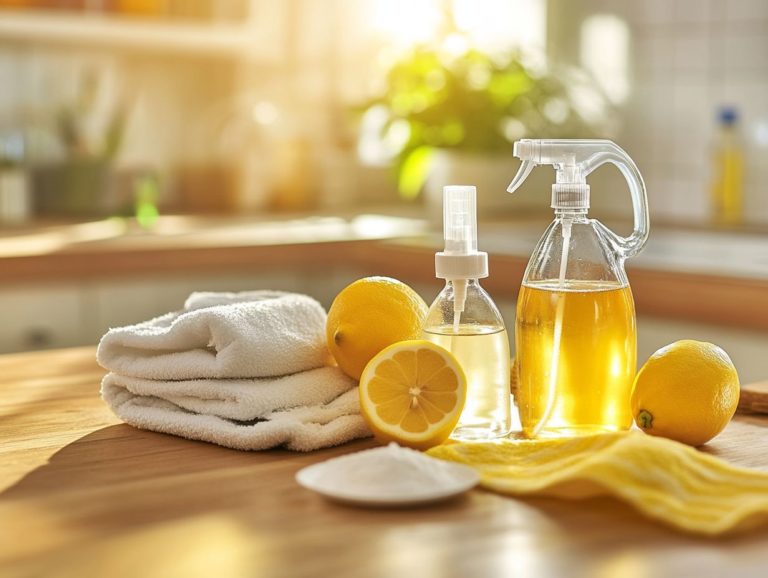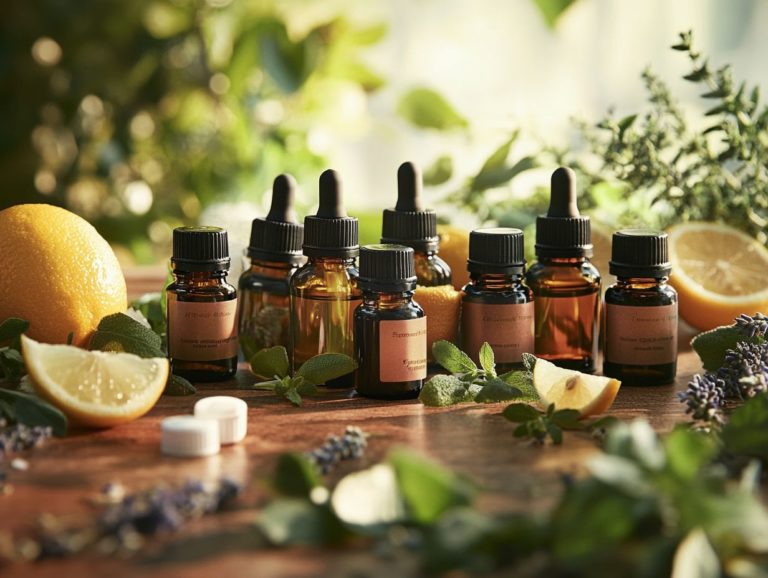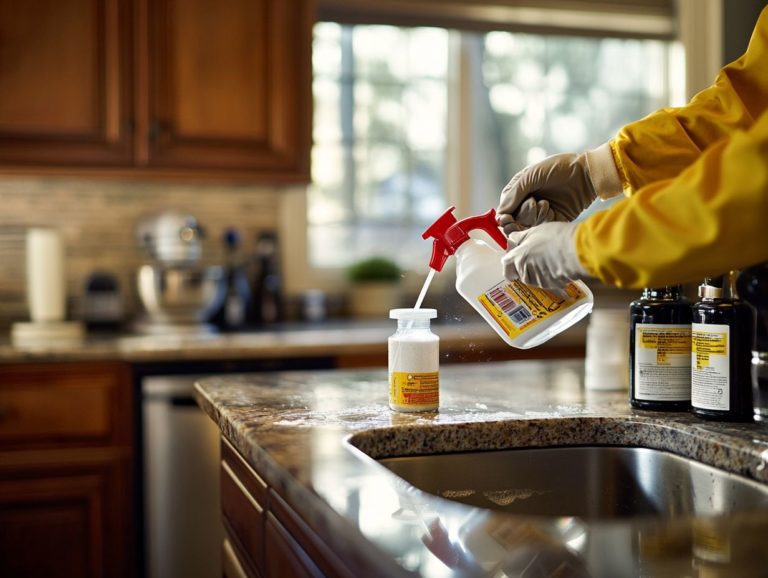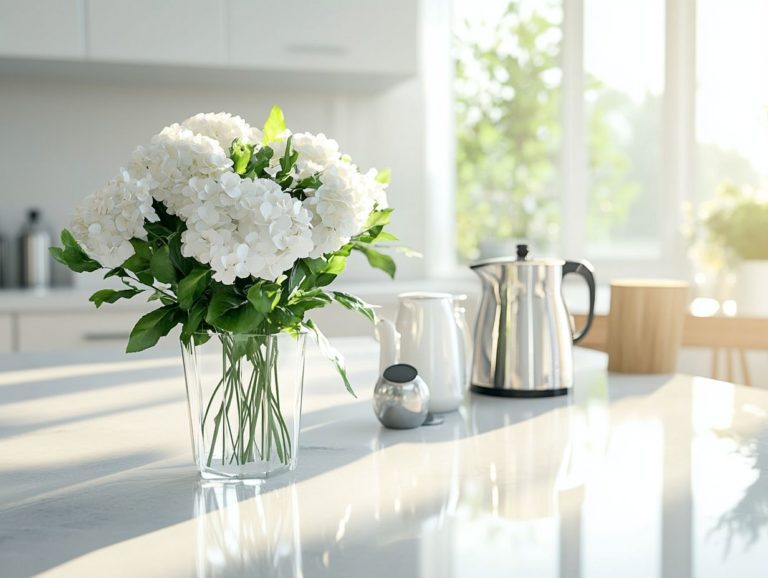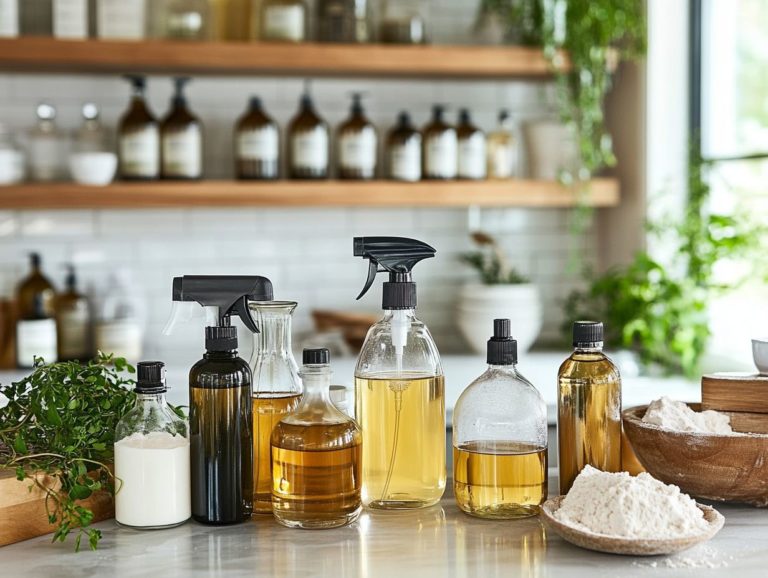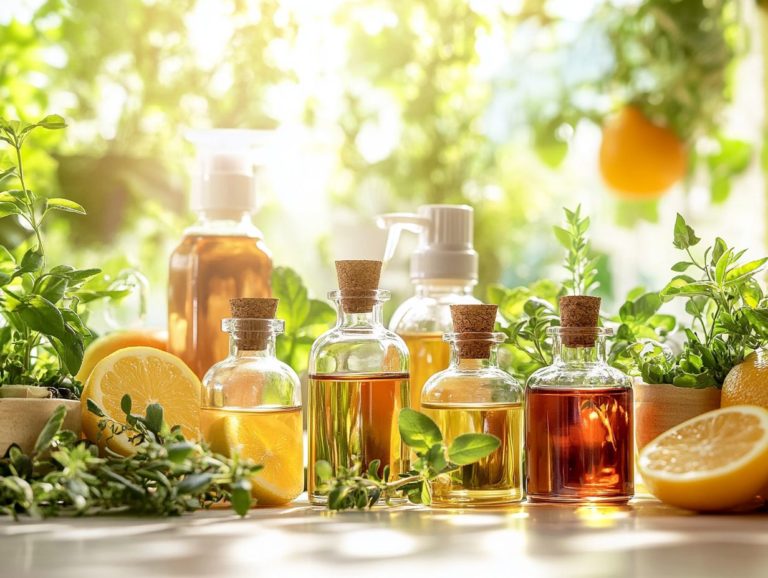How Do I Make My Own All-Purpose Cleaner?
Creating your very own all-purpose cleaner is a straightforward and satisfying way to maintain a sparkling home. You can do this while being mindful of your budget. Using homemade cleaning sprays significantly reduces costs compared to store-bought products.
Delve into the myriad benefits of DIY cleaners. They are cost-effective, eco-friendly, and customizable to suit your unique preferences. With DIY cleaners, you can use essential oils and natural ingredients like white vinegar, dish soap, and baking soda.
Uncover the essential ingredients required and a simple recipe to whip up your cleaner. Common household items like Castile soap, sudsy ammonia, and isopropyl alcohol can be used. You’ll learn about the various surfaces you can tackle with your homemade solution, ensuring every corner of your home gleams.
Get excited to transform your home with this fun cleaning adventure!
Contents
Key Takeaways:
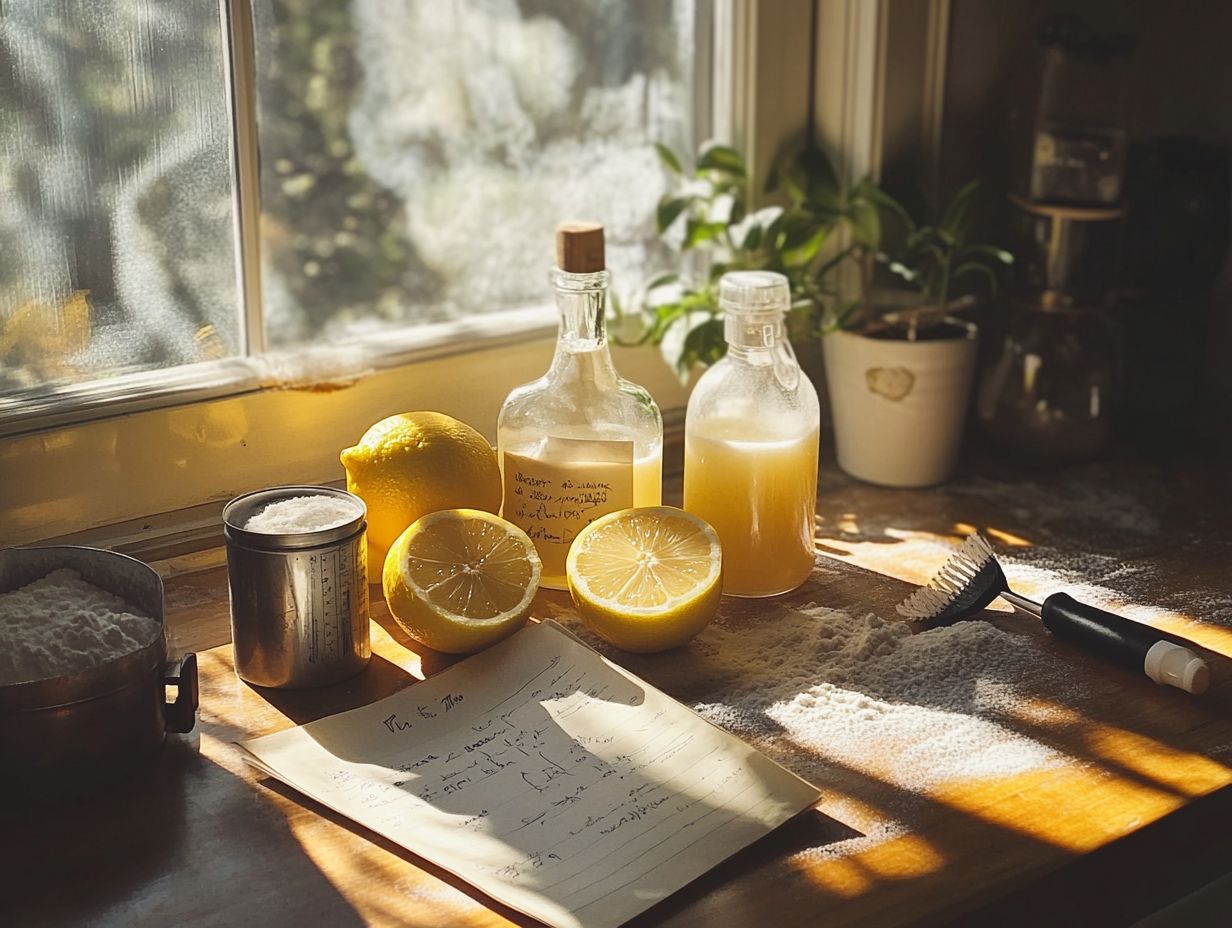
- Making your own all-purpose cleaner saves money and protects the environment.
- You need only a few ingredients like vinegar, essential oils, and isopropyl alcohol.
- Your cleaner can tackle various surfaces, from countertops to floors and furniture.
Why Make Your Own All-Purpose Cleaner?
Creating your own all-purpose cleaner is not just a practical choice; it s a rewarding endeavor that saves you money and gives you control over your cleaning routine, eliminating the need for commercial cleaning products.
With homemade cleaning sprays, you can customize your solutions to meet your specific needs. This ensures an effective clean across a variety of surfaces. Plus, DIY cleaners are typically more environmentally friendly than store-bought counterparts, minimizing chemical exposure for you and your family.
When considering safety, opting for natural ingredients like white vinegar, baking soda, and essential oils gives you the confidence to tackle tough messes while maintaining peace of mind.
1. Cost-effective
One of the standout benefits of creating your own all-purpose cleaner is the money you can save compared to buying commercial cleaning products.
By choosing homemade solutions, you can save a lot over time. For instance, a gallon of white vinegar typically costs around $3 and can be utilized in various recipes. This single ingredient can replace countless pricey bottles of cleaner found on store shelves.
Crafting a simple all-purpose spray is incredibly easy: just mix one part vinegar, one part water, and a few drops of dish soap. Not only is this practical, but when you consider that a commercial cleaner can cost over $5 for just 16 ounces, the savings really start to add up.
Baking soda is another versatile ingredient that can be bought in bulk for about $1.50 for a 5-pound bag. Its countless applications from scrubbing surfaces to deodorizing your home make it an economical choice. Embracing this DIY approach helps you cut down on cleaning expenses and promotes environmentally friendly practices.
2. Environmentally-friendly
Homemade cleaning sprays are an environmentally-friendly alternative to conventional cleaners, allowing you to reduce reliance on harsh chemicals that can harm the planet.
By using simple natural ingredients like white vinegar, baking soda, and essential oils, you can lower your ecological footprint. A blend of vinegar and water effectively tackles grime and odors, while baking soda serves as a gentle scrubber for tougher stains.
Essential oils, such as tea tree or lavender, not only provide delightful scents but also possess antibacterial properties, enhancing your cleaning endeavors. Unlike commercial products that often come in non-biodegradable packaging and contain toxic substances, these eco-friendly recipes promote sustainability.
You can take pride in knowing that the components break down naturally. This contributes positively to the environment, making your cleaning routine both effective and conscientious.
3. Customizable
Crafting your own all-purpose cleaner allows you to customize it to your preferences. You can experiment with various essential oils, such as lemon rind and rosemary sprigs. This not only creates delightful scents but also enhances your cleaning effectiveness.
For example, adding lemon rind can infuse your cleaner with a fresh, uplifting aroma. It not only disinfects surfaces but also leaves them with a bright, citrusy fragrance. Conversely, incorporating rosemary sprigs introduces a lovely herbal scent and antibacterial properties, making them perfect for high-traffic areas like kitchens and bathrooms. Lauren from Queens College, City University of New York, suggests experimenting with various scents to enhance your cleaning routine.
You can tailor your cleaners to suit specific surfaces. Whether you need a gentle touch for delicate countertops or a powerful solution to tackle stubborn grime, every cleaning task can be approached with the perfect blend of functionality and personal style.
What Ingredients Do You Need?
To create an effective all-purpose cleaner, you will need a few simple ingredients, easily sourced from your kitchen or a nearby store. This makes crafting homemade cleaning sprays convenient and accessible for anyone interested in DIY cleaners.
1. Vinegar
Vinegar, especially white vinegar, is an essential ingredient in your homemade cleaning arsenal, thanks to its natural disinfectant properties and remarkable versatility. It slices through tough grease and grime with ease, making it ideal for cleaning kitchens and appliances.
This amazing solution not only cleans but also neutralizes odors, leaving behind a refreshing scent in spaces that might otherwise feel a bit stale. You ll likely appreciate its eco-friendly nature, providing a safer alternative to harsh chemicals that can harm your health and the environment.
However, consider safety when using vinegar, particularly on natural stone surfaces like granite or marble, where the acidity could lead to damage. A smart move is to test a small, inconspicuous area first. This way, you can ensure the surface remains unharmed while still enjoying the benefits of this multi-tasking cleaner.
2. Baking Soda
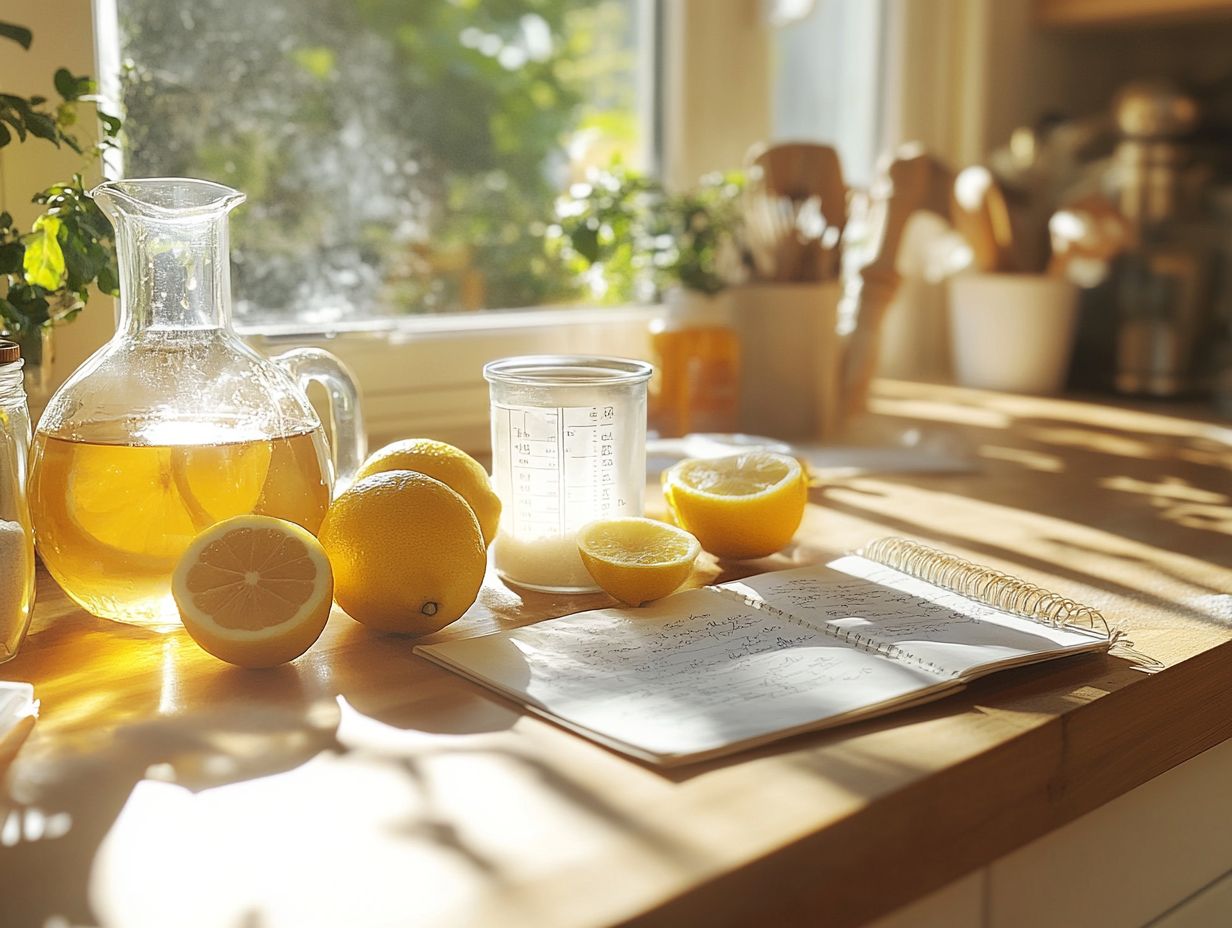
Baking soda is a remarkable ingredient renowned for its deodorizing and cleaning prowess. It is a critical element in many DIY cleaning concoctions. Trusted brands like ARM & HAMMER Baking Soda offer reliable options for your homemade recipes.
Its versatility enables you to tackle various tasks, from banishing stubborn stains on carpets and upholstery to serving as a gentle abrasive for scrubbing sinks and countertops. When you sprinkle it on carpets before vacuuming, it deftly neutralizes odors, leaving behind a fresh scent without resorting to harsh chemicals.
You can even combine it with vinegar to create a delightful foaming action that helps unclog drains and brightens your laundry. Trusted brands like ARM & HAMMER provide a dependable source of baking soda, ensuring this effective cleaning ally is safe for various surfaces, making it an excellent choice for eco-friendly cleaning solutions.
Try creating your own all-purpose cleaner today and see the difference it makes in your home!
3. Essential Oils
Essential oils, like lemon rind and rosemary, do more than just lend delightful fragrances to your homemade cleaning sprays; they also boast natural antimicrobial properties that truly enhance your cleaning efforts.
By incorporating these powerful natural substances, you can create a more inviting atmosphere while tackling those household chores. The zesty scent of lemon can invigorate your workspace, making those tedious tasks feel significantly more manageable.
Meanwhile, the soothing aroma of lavender works wonders in reducing stress and promoting relaxation during your cleaning routine. Consider adding grapefruit essential oil for an additional citrusy kick that enhances your air freshener spray.
When selecting essential oils for specific applications, it’s essential to consider their unique properties. For example, tea tree oil is renowned for its potent disinfectant qualities, making it perfect for bathrooms.
On the other hand, eucalyptus oil excels at purifying the air, which makes it an excellent choice for kitchens. For glass cleaner or carpet stain cleaner, utilizing a combination of essential oils can optimize the effectiveness.
These thoughtful selections not only enhance cleanliness but also elevate your cleaning routines into enjoyable experiences.
4. Water
Water is an essential solvent (a substance that dissolves other substances) in many homemade cleaning sprays, playing a crucial role in diluting other ingredients and enhancing their effectiveness.
Its function goes beyond simple dilution; it helps you achieve the desired consistency for a variety of cleaning tasks, be it a gentle surface cleaner or a more powerful degreaser.
By adjusting the water-to-ingredient ratio, you can customize your spray recipes to address specific needs, ensuring optimal cleaning power while maintaining safety and texture.
For example, a higher concentration of white vinegar might be necessary for a natural stone cleaner, while a diluted mix could serve as an effective air freshener spray.
For instance, a stronger solution may be necessary for tackling stubborn stains, while a lighter mix could be just right for everyday dusting and sanitizing. Embrace experimentation as you discover the perfect balance to meet your unique cleaning challenges.
How To Make Your Own All-Purpose Cleaner?
Making your own all-purpose cleaner is not only easy but also a fun way to keep your home fresh and clean!
Creating your own all-purpose cleaner is an effortlessly elegant process that involves just a few simple steps and readily available ingredients. This allows you to craft effective homemade cleaning sprays tailored to your home, giving you the power to maintain a pristine environment while embracing a more sustainable lifestyle.
1. Gather Your Ingredients
The first step in crafting your own all-purpose cleaner is to gather all the essential ingredients, making sure you have everything at your fingertips for a successful DIY cleaning adventure.
You’ll want to prioritize high-quality components to truly maximize its effectiveness. Key ingredients include:
- White vinegar, a natural disinfectant that works wonders
- Baking soda, perfect for deodorizing any space
- Water, to dilute the mixture to just the right consistency
Consider adding a few drops of essential oils like tea tree or lemon. Not only do they impart a delightful scent, but they also elevate your cleaner s power.
Precision matters, so be mindful of your measurements; a common ratio is one part vinegar to one part water.
These items are easily found at your local grocery store or from reputable online retailers, ensuring you gather the finest products to create your ultimate cleaner.
2. Mix The Ingredients Together
After you’ve gathered your ingredients, it’s time to mix them into a powerful all-purpose cleaner capable of tackling a variety of cleaning tasks.
Get ready to discover the power of your homemade cleaner!
To achieve the most impressive results, start by combining one cup of distilled white vinegar with one cup of water in a pristine spray bottle.
Next, add half a cup of baking soda to amplify the cleaning power but be mindful, as this will create a delightful fizz. Secure the cap tightly and shake gently until the baking soda is fully dissolved.
If you’re aiming for an even stronger cleaning solution, consider adjusting the vinegar-to-water ratio to 2:1 for those stubborn stains.
For optimal consistency, allow the mixture to sit for a few hours before use, giving the ingredients time to meld together, resulting in a more effective and uniform cleaner.
3. Store The Cleaner In A Spray Bottle
Storing your newly crafted all-purpose cleaner in a spray bottle is essential for effortless accessibility, ensuring that your homemade cleaning sprays are always at hand when the urge to tidy up strikes.
It’s equally vital to select a high-quality spray bottle, one that can endure various cleaning agents, and to label it clearly, preventing any potential mix-ups. Proper storage is key; keeping the cleaner in a cool, dark place will help extend its lifespan.
Make it a habit to regularly inspect the spray bottle for any wear and tear, and remain attentive to the scent or appearance of the cleaner. If you notice any unusual odors or discoloration, it may be time to whip up a fresh batch.
Being diligent about these details not only promotes safety but also enhances the cleaning solution’s overall effectiveness.
What Surfaces Can You Use All-Purpose Cleaner On?
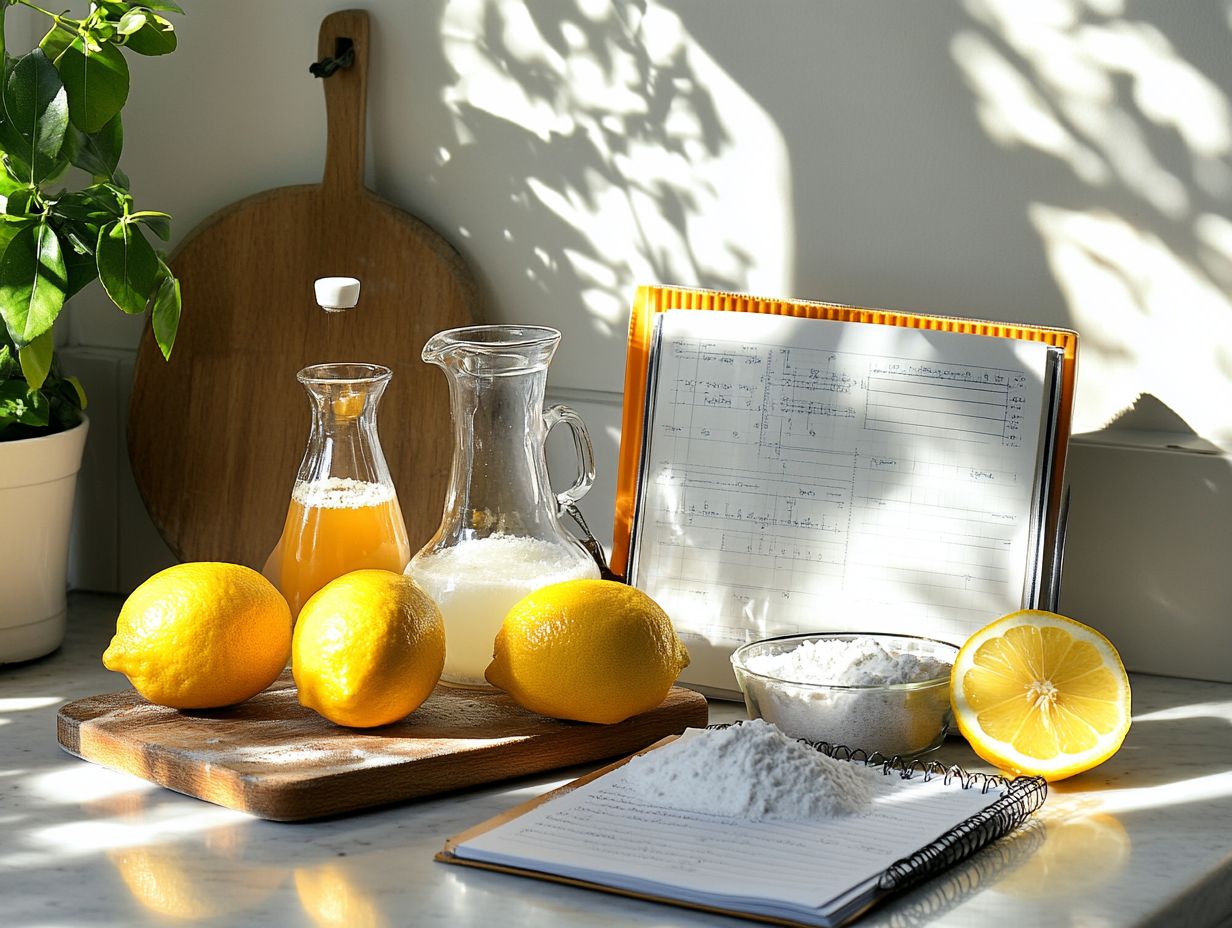
Homemade all-purpose cleaners crafted from simple ingredients are remarkably versatile, allowing you to tackle a wide array of surfaces throughout your home. They become an essential element of your cleaning routine, elevating your approach to maintaining a pristine environment.
1. Kitchen Countertops
Kitchen countertops are high-touch surfaces that call for your regular attention, and an all-purpose cleaner can work wonders in effortlessly removing grease and food residue.
To ensure a hygienic cooking environment, it s crucial to select a cleaner that is safe for food preparation areas, so you can rest easy knowing that no harmful chemicals are lingering on your surfaces.
When using an all-purpose cleaner, start by wiping down the counters with a damp cloth to eliminate any loose debris. After applying the cleaner, let it sit for a few minutes to tackle those stubborn stains before wiping it away with a clean, dry rag.
If you re leaning towards natural solutions, a homemade cleaning spray made from equal parts vinegar and water can effectively sanitize your countertops without introducing harmful substances. This not only creates a safer space for food preparation but also leaves your kitchen smelling refreshingly clean.
2. Bathroom Surfaces
Bathroom surfaces are notorious for harboring germs and bacteria, making them prime candidates for a thorough cleaning with a powerful all-purpose cleaner that can disinfect and deodorize effectively.
By using an appropriate all-purpose cleaner, you can ensure that every corner is addressed not just the sinks and toilets, but also the tubs and countertops where soap residues and daily grime accumulate. It s essential to apply the cleaner generously, allowing it some time to work its magic on those stubborn stains and dirt. This contact time is crucial; it enhances the cleaner’s effectiveness, ensuring that bacteria and odors are eliminated efficiently.
Once you’ve given those surfaces a good scrub with a clean cloth or sponge, a thorough rinse will leave them looking immaculate and fully sanitized, creating a healthier bathroom environment for you.
3. Floors
Using an all-purpose cleaner on your floors can be a game-changer, effectively eliminating dirt and grime while streamlining your cleaning routine.
It’s important to recognize that different types of flooring demand specific approaches to achieve optimal results without risking damage. For example, when it comes to tile, applying the cleaner directly onto the surface and scrubbing with a soft brush or cloth will ensure that all those textured grooves are thoroughly cleaned.
When dealing with hardwood, it s wise to use a damp cloth with just a few drops of cleaner, as excess moisture can warp the wood definitely something you want to avoid. Laminate floors tend to handle harsher cleaners better, but it s still essential to check for compatibility with the material to steer clear of any unsightly discoloration.
Always take a moment to read the labels for guidance before diving in, as maintaining the integrity of your flooring is crucial for its longevity.
4. Glass
Cleaning glass surfaces may seem daunting, but with a high-quality all-purpose cleaner, you can achieve that sparkling, streak-free finish you desire.
To get the best results, use the right method. Start by applying the cleaner to a microfiber cloth instead of spraying it directly onto the glass. This will help minimize streaking and ensure even coverage across the surface.
If you’re aiming for an extra shine, consider mixing a touch of vinegar into your solution. This natural ingredient boosts clarity and cuts through grime effectively. For those stubborn spots, a damp sponge can work wonders before you finish off with a dry cloth.
Keep in mind that working in circular motions often yields the best results, enhancing both the clarity and shine of your glass surfaces.
5. Furniture
Furniture naturally accumulates dust and spills over time, but using an all-purpose cleaner helps maintain its appearance by effectively removing dirt without causing any damage.
Be careful when cleaning to protect your furniture! Different materials like wood, fabric, and leather each have their own sensitivities. Always test the cleaner on a small, hidden area to ensure there are no adverse reactions.
Gentle application is crucial. Use a soft cloth to apply the cleaner, significantly minimizing the risk of scratches and other unintended harm. By taking these precautions, you ll love how your furniture looks and feels when it s clean and well-maintained!
6. Appliances
Using an all-purpose cleaner on your appliances can work wonders, restoring their shine and effortlessly tackling the stains, grease, and grime that accumulate from daily use.
It s essential to select the right cleaner for each specific appliance to prevent any potential damage. For example, when cleaning your microwave, direct your attention to the interior surfaces that often bear the brunt of food splatters. A simple mixture of vinegar and water can make this task easier and more effective.
For your refrigerator, focus on the door seals and shelves where spills tend to happen frequently, ensuring that food-contact areas are properly sanitized. Ovens, which are often neglected, require a more focused approach; removing debris from the oven walls and drip pans is key for safe cooking.
Always adhere to safety guidelines and steer clear of harsh chemicals on food-contact surfaces to maintain a hygienic kitchen environment.
Frequently Asked Questions
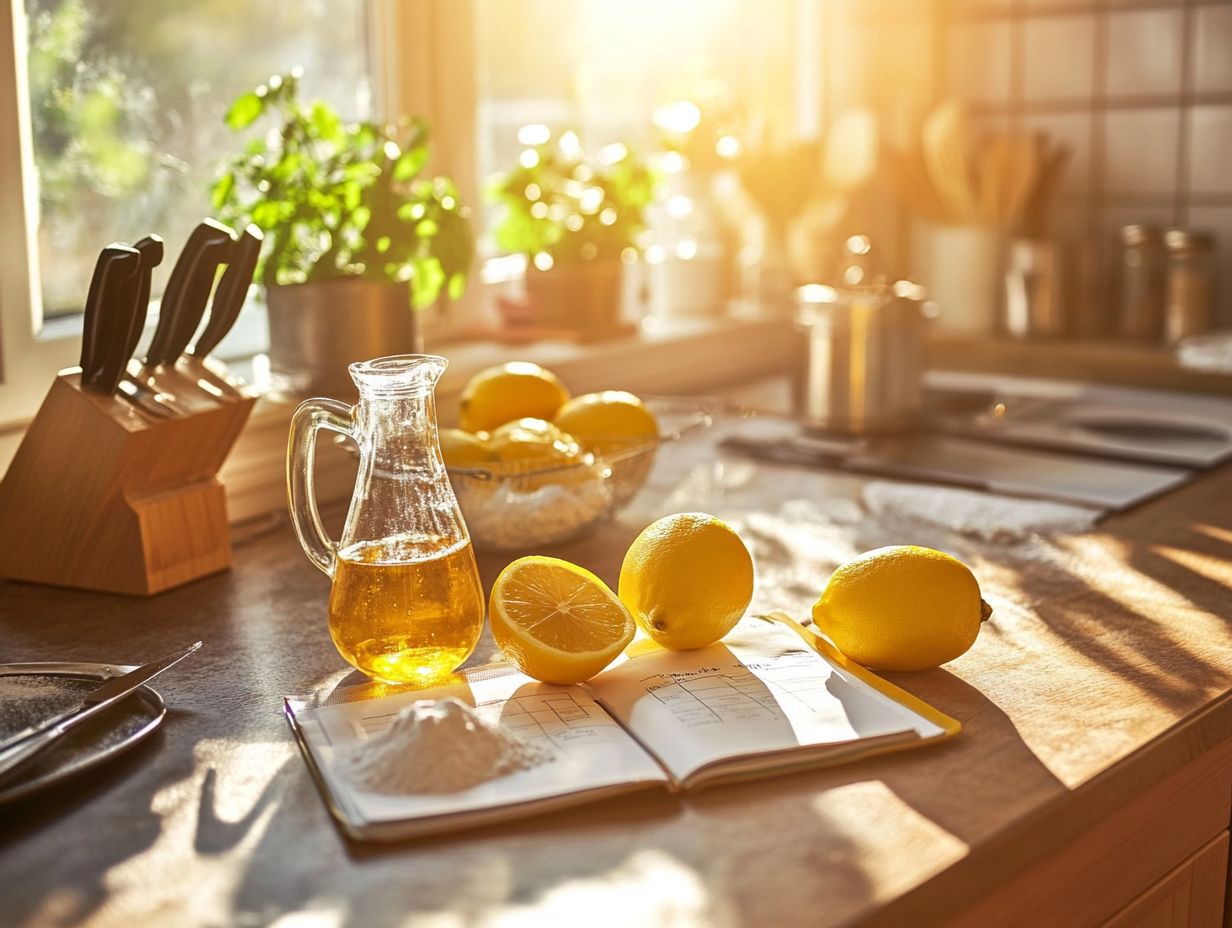
How Do I Make My Own All-Purpose Cleaner?
Making your own all-purpose cleaner is simple and cost-effective. All you need are a few ingredients and a spray bottle. Here’s how to make it:
What ingredients do I need to make my own all-purpose cleaner?
The basic ingredients for an all-purpose cleaner are water, white vinegar, and essential oil for scent. You can also add baking soda for extra cleaning power. For a different scent, try using rosemary sprigs or lemon rind. Adding a bit of dish soap can enhance cleaning power, especially for greasy surfaces.
Can I use any type of vinegar for my all-purpose cleaner?
While white vinegar is the most commonly used for cleaning, you can also use apple cider vinegar or even lemon juice as a substitute. For a different approach, ARM & HAMMER Baking Soda can be combined with vinegar for effective cleaning.
How do I mix the ingredients for my all-purpose cleaner?
To make your all-purpose cleaner, mix equal parts of water and vinegar in a spray bottle. If desired, add a few drops of essential oil for a pleasant scent and a sprinkle of baking soda. For added disinfectant properties, include a small amount of isopropyl alcohol. Shake well before each use.
Is it safe to use on all surfaces?
Yes, the all-purpose cleaner is safe for most surfaces, including countertops, floors, and glass. Always test a small area first, especially on delicate surfaces like granite or marble.
For glass, a simple mix of vinegar and water works wonders. If you’re cleaning natural stone, consider using a gentle cleaner that won’t harm the surface.
How long does the all-purpose cleaner last?
The cleaner can last for several weeks when stored in a cool, dark place. For the best results, make a fresh batch every 1-2 weeks!
Incorporating homemade cleaners into your routine not only keeps your home safe and clean but also allows you to customize your cleaning products. Make your home shine with a fresh batch every week!

